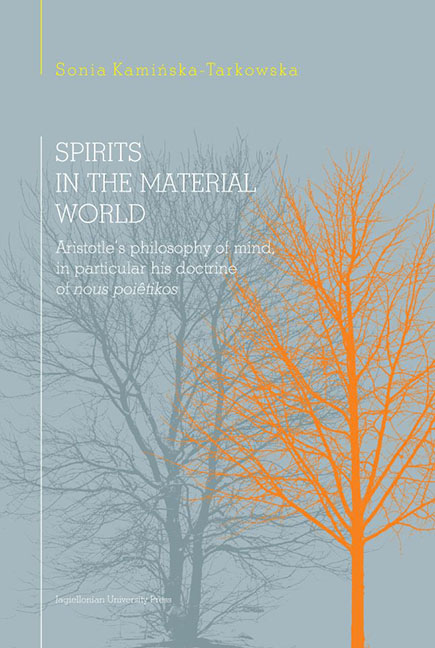 Spirits in the Material World
Spirits in the Material World Conclusions?
Published online by Cambridge University Press: 14 October 2023
Summary
If we made immortality the ultimate criterion, then I would bet on the mystics (despite all my criticism towards them, see for instance: my discussion with Caston or Burnyeat). Aristotle did not believe in individual immortality (endorsed by the rationalists), but in the immortality of the species (in biological terms). This, together with the non-theist account of the Deity, makes the mystical interpretations more appropriate. The Christian ones, despite being prevailing in our Western culture, are sometimes an ‘abuse’ of Aristotle or – broadly speaking – the ancient worldview. And although the vision of having an individual immortal soul that unites with God after our bodily death and retains its personality is nice and comforting (to some extent, because in most cases the soul is powerless and can do nothing, only ‘sit and watch’), it is very far from Aristotle. Moreover, Thomism, for instance, has this advantage over almost every reading of the Stagirite: that it is very coherent and fixes all the ‘holes’ in Aristotle. This is, I believe, one of the main reasons (besides the religious motivation) why Franz Brentano endorsed it. He claimed coherence to be the most important feature of a good interpretation. He was very much against incorporating foreign views or leaving some questions unanswered (which is what many scholars are forced to do while working on ancient thinkers). But it is here where I believe he made a mistake. First of all, Thomism does incorporate heterogenic views into Aristotelianism, creationism being the most vivid example of not only foreign, but also contradictory views. Rationalism simply comes at a bigger price … Second of all, Brentano embarked on a breakneck project to introduce an agreement between Theophrastus and Eudemus. However, instead of frankly admitting that there are both rational and mystical elements in Aristotle, he tried to show that Eudemus meant something else and thus bring him nearer to Theophrastus (whom he obviously preferred), and on this basis, he built his Christian interpretation. And this is what led him astray.
For now (and apart from my personal preference), let us accept a peaceful coexistence of rational and mystical elements in Aristotle.
- Type
- Chapter
- Information
- Spirits in the Material WorldAristotle's Philosophy of Mind in Particular His Doctrine of Nous Poiêtikos, pp. 183 - 184Publisher: Jagiellonian University PressPrint publication year: 2022


